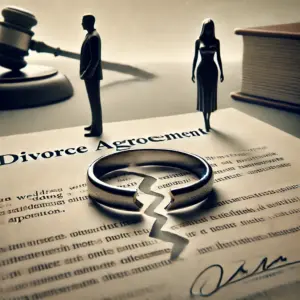Divorce is a significant legal and emotional decision that requires careful consideration. In Illinois, the process for dissolving a marriage follows specific legal guidelines, including the recognized grounds for divorce.

Whether you are contemplating filing for divorce or have already made the decision, understanding the legal framework can help you navigate the process with greater confidence. Consulting a Des Plaines divorce lawyer or a Northbrook divorce lawyer can provide the guidance needed to protect your interests.
No-Fault Divorce in Illinois
Illinois is a no-fault divorce state, meaning that the only legally recognized ground for divorce is “irreconcilable differences.” The state no longer allows fault-based divorces, eliminating the need to prove misconduct such as adultery, abandonment, or cruelty. Before 2016, Illinois recognized 10 “grounds for divorce” that a spouse could legally claim. There were 9 fault-based grounds, and then there was“irreconcilable differences”. When the courts recognized that the grounds under which divorces were filed did not impact the outcome of the proceedings, they revamped the state’s divorce laws, doing away with fault-based divorce in its entirety.
What Are Irreconcilable Differences?
Under Illinois law, irreconcilable differences mean that the marriage has broken down beyond repair, and efforts at reconciliation have been unsuccessful or would not be in the best interest of the family.
Criteria for No-Fault Divorce in Illinois
In a no-fault divorce, neither spouse is considered legally responsible for the breakdown of the marriage. As such, the spouses and their divorce attorneys won’t need to worry about gathering evidence to prove fault or defending themselves against allegations of wrongdoing. Instead, the spouses will simply need to meet the following criteria.
Before filing for divorce in Illinois, at least one spouse must have been a resident of the state for a minimum of 90 days. This residency requirement ensures that Illinois courts have jurisdiction over the divorce proceedings. It applies whether the spouses are filing a contested or an uncontested divorce. To prove residency, spouses can provide utility bills, rental agreements, and similar types of documents. If you are unsure about meeting this requirement, a divorce lawyer can assess your situation and provide legal counsel.
Additionally, if one spouse contests the divorce, the court may require proof that the couple has lived separately for at least six months, though this requirement is often waived when both spouses agree to proceed with the dissolution.
The Divorce Process in Illinois
Filing a Petition for Dissolution of Marriage
The divorce process officially begins when one spouse files a Petition for Dissolution of Marriage with the circuit court in the county where they or their spouse resides. This document outlines the legal basis for the divorce and any requests regarding asset division, child custody, or spousal support.
Serving the Petition
After the petition is filed, the other spouse must be formally served with divorce papers. This can be done through personal service by a sheriff or a professional process server. If the other spouse cannot be located, alternative methods of service, such as publication in a newspaper, may be used.
Response and Negotiation
The spouse who receives the petition has the opportunity to respond. If both parties agree on key issues—such as property division, child custody, and spousal support—the divorce can proceed as an uncontested case, making the process smoother and more cost-effective. However, if disputes arise, mediation or court intervention may be necessary.
Court Proceedings and Final Judgment
If spouses cannot agree on all terms, a judge may hold hearings to resolve contested matters. Once all issues are settled, the court issues a Judgment of Dissolution of Marriage, which finalizes the divorce.
Key Issues in Illinois Divorces
Division of Assets and Debts
Illinois follows an “equitable distribution” approach, meaning that marital assets and debts are divided fairly, though not necessarily equally. Courts consider factors such as each spouse’s income, contributions to the marriage, and future financial needs when determining asset division. Seeking legal guidance from a divorce lawyer can help ensure a fair settlement.
Child Custody and Parenting Time
Child custody, now referred to as “allocation of parental responsibilities,” is determined based on the best interests of the child. Parenting time (formerly known as visitation) arrangements are also established to ensure the child maintains a meaningful relationship with both parents. Courts consider factors such as the child’s relationship with each parent, each parent’s ability to provide care, and any history of domestic violence.
Spousal Maintenance (Alimony)
Spousal maintenance, commonly known as alimony, is not automatically granted in Illinois divorces. Instead, courts evaluate factors such as the length of the marriage, each spouse’s earning capacity, and contributions to the household to determine whether support should be awarded and for how long.
Child Support
Illinois uses a standardized formula to calculate child support obligations based on both parents’ incomes and the child’s needs. Parents may negotiate an agreement, but the court must approve any child support arrangement to ensure it meets legal requirements.
Why Legal Representation Matters
Divorce can be a complex legal process with long-term implications. A divorce lawyer can help you understand your rights, negotiate favorable terms, and represent your interests in court if necessary.
If you are considering divorce or have already initiated the process, seeking legal counsel can provide clarity and peace of mind. Contacting an experienced Illinois divorce attorney is a crucial step toward securing your future and protecting your rights.

